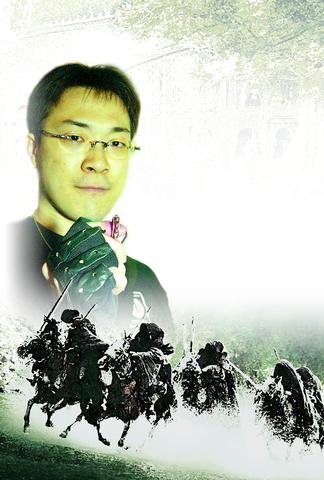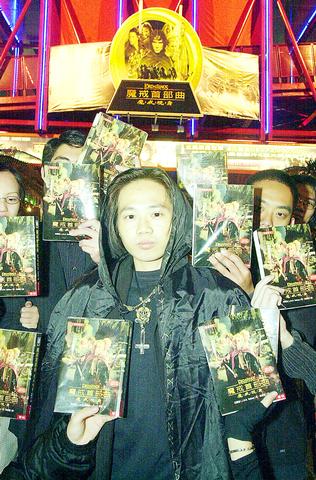Last Thursday, as The Lord of the Rings unspooled for Taiwanese audiences, a clique of zealous fans gathered at Taipei's Warner Village cineplex. Some 200 youngsters, uniformed in black T-shirts with JRRT (J.R.R. Tolkien) on the front and "honor guard of the rings" on the back, held up placards reading: "Tolkien, Happy 110th Birthday!" "Hobbit Rules All!" and "Harry Potter? Who?" Each held a Chinese translation of The Lord of the Rings and together they recited some of the poems from the book.
To the small crowd of curious onlookers, it was obvious the group were fans of the book -- what with their Gandalf costumes and plastic swords -- but this small group were in fact pioneers of Chinese-language fantasy/adventure literature and the key contingent behind the recent The Lord of the Rings fever in Taiwan.

PHOTO: CHIANG YING-YING, TAIPEI TIMES. GRAPHIC COURTESY OF MATA
The organizer of the "fan ceremony" is a tall 26-year-old with a child-like face and a bizarre name: Lucifer Chu (

PHOTO: CHIANG YING-YING, TAIPEI TIMES
For Chu, the event is the culmination of a lot of work, and the NT$80,000 pocket change.
As the translator of a new Chinese-language version of the books (The Lord of the Rings' trilogy and The Hobbit), he led the charge on marketing the book to a new fan base in Taiwan and earned himself millions of NT dollars in the process.
Talking to Chu, one can't help but notice the way he plays with a ring hung on a chain around his neck or the e-generation jargon that spouts from his youthful face. By contrast, his comments on Tolkien's work are mature, knowledgeable and authoritative.
"Taiwan's fantasy literature started with my column eight years ago," he said while fidgeting with his ring.
Chu's translation of The Lord of the Rings trilogy is titled Mo-jieh (
Despite the fact that the final volume of The Lord of the Rings trilogy was published almost 50 years ago, Taiwan's readers were not introduced to the book until 1997, when Linking Publishing (
This time around, Linking has printed 100,000 sets of Chu's translations of the books (including The Lord of the Rings trilogy and The Hobbit) and, given public enthusiasm, there will likely be more printings.
Linking's editor in chief, Lin Tsai-chueh (
Eight years ago, when Chu was an 18-year-old high-school student, he was already working as a columnist for a computer magazine called Software World (
"I had heard that many of the games I played partially originated or were adapted from The Lord of the Rings. As I started reading it, I realized it really was the beginning of all the legends," Chu said.
Starting in 1997, Chu began translating various books from the fantasy literature genre, such as Dragonlance Chronicle, and the Dark Elf trilogy as well as Isaac Asimov's science fiction Foundation series. He and his friends founded a Web site titled Lucifer's Hell (路西法的地獄) about fantasy literature and related games. It began as a small site maintained by two people and visited by about 1,000 fans. It was through chatting on his site that Chu and his fellow ringers learned of plans to make a movie of Tolkien's trilogy in New Zealand. Filming was to begin in 1999 and be released in time for Christmas 2001. They were likely the first in Taiwan to learn the news, and easily the most excited by it.
"When New Line [the production company] announced they would have a 26-minute screening at Cannes in early 2001, I decided to talk to Linking and tell them that I wanted to re-translate the books," he said.
Chu pointed out to Linking, a publisher known for its pure literature products, that the existing Chinese translation was poor and failed to speak to fantasy/adventure fans. Moreover, Linking's marketing strategy had flaws, too.
Chu proposed a bold plan which later brought him a fortune. "I said I could assure them that the book would sell over 10,000 sets (40,000 copies). If sales did not reach that number, I wouldn't charge them a thing." Otherwise, Chu would receive 9 percent of the sales of each book.
"It was big, bold gamble for me," Chu said. He quit his job at a public relations company and worked for nine months translating 1,800 pages of Tolkien's four books.
For Linking, re-translating the book was not only risky but embarrassing because it was a tacit admission that the previous version was a failure.
Looking back, Chen Chiu-ling (
"In Taiwan's modern literature scene, there is no fantasy literature tradition. Neither is there in the translation circle," said Chu. Children's literature has a few translations of Western fantasy literature and computer gaming is the only area exploring fantasy worlds, he added.
Chu knows a lot about games as he began playing them at the age of eight and for years could play for as long as 10 hours at a time.
"In the games, there is a systematic translation for the terminology. We know what elves look like. We know how to translate `orcs,' `elves,' or `dark lords.' Those who play fantasy games share a common knowledge and we're able to visualize the fantasy world in The Lord of the Rings," Chu said. But the previous translation provided "strange terms" at odds with the language for he and his fellow gamers had been developing for years.
Chu's Web site has a forum to discuss translation problems with The Lord of the Rings. According to him, there are about 20,000 Taiwanese "ringers," most of whom dwell in on-line game forums and chat rooms.
In order to make sales reach the magic number of 10,000 sets, Chu's marketing pitch to Linking included establishing retail channels to reach game players, setting up advance sales online, and working closely with the film's distributor in Taiwan.
Lucifer's Hell began collecting updates about the making of the film starting last year. The Web site's more enthusiastic supporters helped translate daily news articles from sources such as USA Today and the New York Times and sent these stories to both Linking and the film's distributor, Mata Entertainment. The site also established links with TheOneRing.com, the world's biggest Tolkien fan site, to provide more information for fans. Lucifer's Hell soon became the most comprehensive Chinese-language Web site for The Lord of the Rings.
All the work paid off.
At a midnight book launch party on the 22nd of last month, 250 sets were sold in 28 minutes, another 1000 sets were sold the next day, and books.com.tw (
"We feel so touched seeing the enthusiasm of Chu and the books' fans. It's been a win-win situation for both of us," said Linking's marketing manager Chen.
As for Chu, he's scheduled to make dozens of speeches, takes daily calls from media and has book-signings through March.
"I am probably another example [after 17-year-old Tseng Jeng-cheng (曾政承) won the World Cyber Games] that playing computer games will not turn you into a bad kid. On the contrary, it may help you earn a fortune," said Chu.

Cheng Ching-hsiang (鄭青祥) turned a small triangle of concrete jammed between two old shops into a cool little bar called 9dimension. In front of the shop, a steampunk-like structure was welded by himself to serve as a booth where he prepares cocktails. “Yancheng used to be just old people,” he says, “but now young people are coming and creating the New Yancheng.” Around the corner, Yu Hsiu-jao (饒毓琇), opened Tiny Cafe. True to its name, it is the size of a cupboard and serves cold-brewed coffee. “Small shops are so special and have personality,” she says, “people come to Yancheng to find such treasures.” She

In July of 1995, a group of local DJs began posting an event flyer around Taipei. It was cheaply photocopied and nearly all in English, with a hand-drawn map on the back and, on the front, a big red hand print alongside one prominent line of text, “Finally… THE PARTY.” The map led to a remote floodplain in Taipei County (now New Taipei City) just across the Tamsui River from Taipei. The organizers got permission from no one. They just drove up in a blue Taiwanese pickup truck, set up a generator, two speakers, two turntables and a mixer. They

Former Chinese Nationalist Party (KMT) chairwoman Hung Hsiu-chu’s (洪秀柱) attendance at the Chinese Communist Party’s (CPP) “Chinese People’s War of Resistance Against Japanese Aggression and the World Anti-Fascist War” parade in Beijing is infuriating, embarrassing and insulting to nearly everyone in Taiwan, and Taiwan’s friends and allies. She is also ripping off bandages and pouring salt into old wounds. In the process she managed to tie both the KMT and the Democratic Progressive Party (DPP) into uncomfortable knots. The KMT continues to honor their heroic fighters, who defended China against the invading Japanese Empire, which inflicted unimaginable horrors on the

Hannah Liao (廖宸萱) recalls the harassment she experienced on dating apps, an experience that left her frightened and disgusted. “I’ve tried some voice-based dating apps,” the 30-year-old says. “Right away, some guys would say things like, ‘Wanna talk dirty?’ or ‘Wanna suck my d**k?’” she says. Liao’s story is not unique. Ministry of Health and Welfare statistics show a more than 50 percent rise in sexual assault cases related to online encounters over the past five years. In 2023 alone, women comprised 7,698 of the 9,413 reported victims. Faced with a dating landscape that can feel more predatory than promising, many in